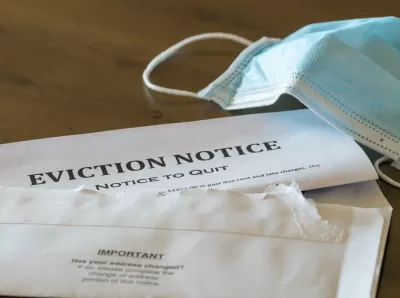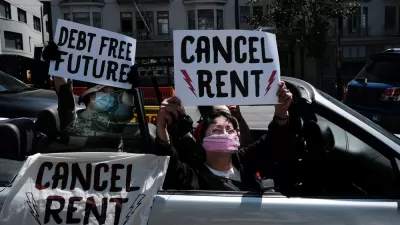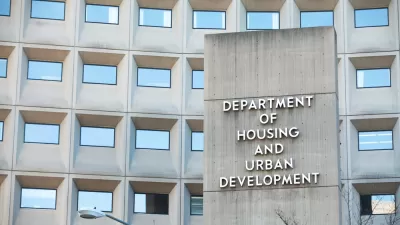Evictions incur immense costs for the public and nonprofit sector, according to new analysis from the Kinder Institute for Urban Research.

"Researchers at the Kinder Institute for Urban Research estimate that in Harris County, the public and private sectors spend $315,680,000 per year addressing the county’s uniquely large mass-eviction crisis," report Stephen Averill Sherman and Carlos Villegas. Those figures only include the costs already enumerated as the most obvious externalities of eviction, but many more expenses are likely hiding downstream of the eviction process, according to the article.
The article notes that evictions occur in "alarmingly high" numbers in Harris County, where Houston is located, according to data cited in the article from Eviction Lab. Therein lies both a problem, and potential solutions, according to Sherman and Villegas:
Houston is not an unusually poor major city, nor does Harris County have an unusually high share of renters (as seen in Table 1, it’s somewhere around the median for the top 10). Therefore, the eviction crisis seems endemic to discrete policies and legal practices within the state and region. But there are ways to address these challenges. Small, inexpensive policies, such as free legal assistance in eviction court, benefit not only the tenant but the bottom line for Harris County’s public coffers, shelters and charity medical providers.
Officials from Harris County and the city of Houston formed a Housing Stability Task Force in June, according to the article, with the Kinder Institute offering technical assistance, but some of the recommendations of the task force have yet to be implemented by county and city officials.
FULL STORY: Evictions cost Harris County over $315 million a year — that was before COVID-19

Alabama: Trump Terminates Settlements for Black Communities Harmed By Raw Sewage
Trump deemed the landmark civil rights agreement “illegal DEI and environmental justice policy.”

Study: Maui’s Plan to Convert Vacation Rentals to Long-Term Housing Could Cause Nearly $1 Billion Economic Loss
The plan would reduce visitor accommodation by 25% resulting in 1,900 jobs lost.

Planetizen Federal Action Tracker
A weekly monitor of how Trump’s orders and actions are impacting planners and planning in America.

Waymo Gets Permission to Map SF’s Market Street
If allowed to operate on the traffic-restricted street, Waymo’s autonomous taxis would have a leg up over ride-hailing competitors — and counter the city’s efforts to grow bike and pedestrian on the thoroughfare.

Parklet Symposium Highlights the Success of Shared Spaces
Parklets got a boost during the Covid-19 pandemic, when the concept was translated to outdoor dining programs that offered restaurants a lifeline during the shutdown.

Federal Homelessness Agency Places Entire Staff on Leave
The U.S. Interagency Council on Homelessness is the only federal agency dedicated to preventing and ending homelessness.
Urban Design for Planners 1: Software Tools
This six-course series explores essential urban design concepts using open source software and equips planners with the tools they need to participate fully in the urban design process.
Planning for Universal Design
Learn the tools for implementing Universal Design in planning regulations.
Caltrans
Smith Gee Studio
Institute for Housing and Urban Development Studies (IHS)
City of Grandview
Harvard GSD Executive Education
Toledo-Lucas County Plan Commissions
Salt Lake City
NYU Wagner Graduate School of Public Service





























